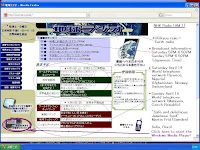We often hear that Japan has a low self-sufficiency rate when it comes to food. It is said that Japan is "only 40% self-sufficient" but that refers to calories in general. For rice, Japan is next to 100% self-sufficient, and for vegetables the rate is 79% (2005). That is actually quite high! However, the rate for beef is 43% and Pork is 50%. In other words, if you eat a lot of meat, you are depending on imports, which means you are also depending on a lot of oil for transportation to get your hamburgers to Tokyo. As oil prices are rising, and we reach what is called Peak Oil (when pumping oil from the ground is no longer profitable), food habits will have to change. And of course, if you care about global warming, you may also want to reduce consumption of foods from very distant places. In 2006, Japan imported fresh and processed vegetables worth about 228 billion yen from China, such as leeks, garlic, satoimo taro roots and shiitake mushrooms, according to Japan External ...













